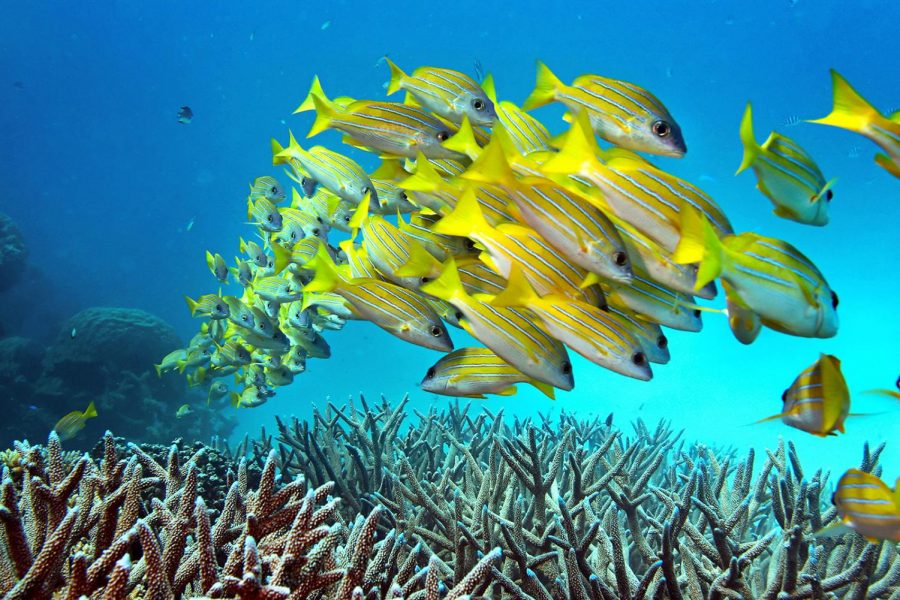The moral dilemma of The Great Barrier Reef
Photo Courtesy of Tribune News Service
A school of fish hovers over staghorn coral on the Great Barrier Reef in Australia.
Mar 10, 2019
Would you rather dump one million tons of sludge onto the Great Barrier Reef or allow ships to run aground the reefs, potentially killing those on board?
The Great Barrier Reef Marine Park Authority just approved of a permit for about one million tons of sludge to be dumped on the reef. In a BBC article published last week, the GBRMPA made claims that dumping this sludge will allow boats to “safely and reliably access ports and marinas.”
GBRMPA wants to allow this dredging, an operation done to remove sediment from the bottom of one area and relocating it to another area, to deepen the Hay Point Port to minimize the amount of ship crashes in the area. In 2011, National Geographic released an article examining the effect of wrecked ships stuck in reef areas, also known as black reefs. These ships release iron over extended periods of time which cause irreparable damage and ultimately kill the reefs. So what’s the alternative? Sludge dumping.
Dumping this sludge onto reefs may cause a bleaching event. Coral reef bleaching occurs when the healthy invertebrates that live in coral tissue are killed or stripped away. These bleaching events are often fatal for the coral, but there are instances where the coral can recover if the bleaching is mild and the severity of the cause lessens over time. Simon Boxall from the National Oceanography Centre Southampton believes the distance that they dump this sludge will determine the fate of the reef. The permit allows dumping within 14.5 km of the Great Barrier Reef. If the sludge is dumped further offshore, then the reefs will feel less of an impact, but there are still contaminants being released into the ocean such as heavy metals, like iron, that can bleach the reef regardless of where the dumping site is.
This decision came down to the GBRMPA deciding whether a black reef or a possible bleaching would impact the Great Barrier Reef more. Decisions like these are not the only ones hurting our coral. The bleaching events of the past are often from the carbon dioxide the reefs are now absorbing due to global warming and the chemicals from pollution the coral is now exposed to everyday. It is important to consider reef-specific tactics to being eco-friendly, such as not releasing pesticides or cleaning chemicals into waterways. Switching over to sunscreens and household products that are proven to be better for reefs are just a few small steps you can take to help make the decay of our reefs less substantial.
Get The Daily Illini in your inbox!
Choosing between shipwrecks permanently harming the reefs or bleaching, which has a small possibility of recovery, is the reality we are facing. The coral loses regardless of what decision is made; it is only the severity that varies. In this case, choosing to dump the sludge is the best of two possible scenarios, but if alternative shipping routes, or other possibilities in general are looked into, then this problem could be eliminated entirely. This planet is facing the brunt of consumerism in the worst way possible. We are constantly choosing the most economical option as opposed to the most environmentally friendly option.
This dumping event is just one of many that we will continue to see if we don’t seek alternatives. We can lessen this damage of reefs by eliminating personal waste that could bleach them even further than just the dredgings alone. The GBRMPA had to make a difficult decision this week, but unless we act now, there soon won’t be any reef left to make decisions on anyway.
Abby is a sophomore in LAS.






